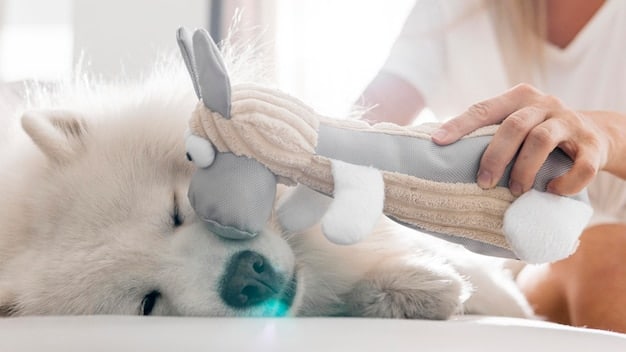Arthritis in Senior Pets: New Pain Management & Therapies 2025

Arthritis in senior pets is a common concern addressed through new pain management therapies and lifestyle adjustments in 2025, including innovative medications, physical therapy techniques, and home modifications to improve comfort and mobility.
As our beloved pets enter their senior years, the likelihood of developing arthritis increases, bringing with it discomfort and reduced mobility. Arthritis in senior pets: New pain management therapies and lifestyle adjustments for 2025 offer hope for alleviating these challenges, enhancing their quality of life.
Understanding Arthritis in Senior Pets
Arthritis, or osteoarthritis, is a degenerative joint disease that affects many older pets. It involves the breakdown of cartilage, the cushioning tissue in joints, leading to pain, stiffness, and reduced range of motion. Recognizing the signs early is crucial for effective management.
Common Symptoms of Arthritis
Keep an eye out for symptoms such as reluctance to move, limping, stiffness after rest, irritability when touched, and decreased activity levels. Early detection can significantly improve your pet’s comfort.
How Arthritis Affects Pets
Arthritis doesn’t just cause physical discomfort; it can also impact a pet’s overall well-being. Reduced mobility can lead to decreased social interaction, weight gain, and even depression. Understanding these effects helps in providing comprehensive care.
- Limping or stiffness in one or more legs
- Difficulty getting up or lying down
- Reduced interest in playing or walks
- Changes in appetite or sleep patterns
Effective management of arthritis requires a multi-faceted approach, addressing both the physical and emotional needs of your pet. Regular veterinary check-ups are essential for monitoring the progression of the disease and adjusting treatment plans as needed. By staying informed and proactive, you can help your senior pet live a happier, more comfortable life despite arthritis.
New Pain Management Therapies for 2025
The field of veterinary medicine is constantly evolving, bringing forth new and innovative pain management therapies for pets with arthritis. In 2025, several advanced treatments are becoming more widely available, offering improved options for managing pain and enhancing mobility.
Advanced Medications
New non-steroidal anti-inflammatory drugs (NSAIDs) with fewer side effects are being developed, providing safer and more effective pain relief. Additionally, there’s increasing use of drugs that protect cartilage and promote joint health.
Regenerative Therapies
Regenerative medicine, including stem cell therapy and platelet-rich plasma (PRP) injections, is gaining popularity. These therapies aim to repair damaged joint tissue and reduce inflammation, potentially slowing the progression of arthritis.

- Monoclonal antibody therapy: Targets and neutralizes pain signals.
- Microcurrent therapy: Uses low-level electrical currents to stimulate healing.
- Pulsed electromagnetic field therapy (PEMF): Reduces inflammation and pain.
These cutting-edge pain management options provide hope for senior pets suffering from arthritis, offering targeted relief and improved joint function. Consulting with a veterinarian about these new therapies can help determine the most suitable treatment plan for your pet’s specific needs.
The Role of Physical Therapy and Rehabilitation
Physical therapy plays a vital role in managing arthritis in senior pets. It helps improve mobility, reduce pain, and maintain muscle strength. A tailored rehabilitation program can significantly enhance your pet’s quality of life.
Benefits of Physical Therapy
Physical therapy techniques such as therapeutic exercises, hydrotherapy, and massage can help improve joint flexibility, reduce muscle stiffness, and alleviate pain. These methods can also improve circulation and promote healing.
Home Exercises and Activities
Simple exercises like gentle stretching, short walks, and controlled movements can be performed at home under the guidance of a veterinary rehabilitation specialist. These activities help maintain joint mobility and muscle strength.
- Underwater treadmill: Reduces impact on joints while exercising.
- Range-of-motion exercises: Improves joint flexibility and reduces stiffness.
- Massage therapy: Relieves muscle tension and promotes relaxation.
Incorporating physical therapy and rehabilitation into your pet’s arthritis management plan can provide long-term benefits, helping them stay active and comfortable. Regular sessions with a qualified veterinary rehabilitation therapist can make a significant difference in their mobility and overall well-being.
Lifestyle Adjustments for Arthritic Pets
Making certain lifestyle adjustments can greatly improve the comfort and mobility of senior pets with arthritis. These changes focus on creating a supportive environment and reducing strain on their joints.
Creating a Comfortable Home Environment
Provide soft bedding, such as orthopedic beds, to cushion joints and ease pressure. Ensure easy access to food and water, and consider using ramps or steps to help your pet reach their favorite spots.
Diet and Weight Management
Maintaining a healthy weight is crucial for reducing stress on joints. Work with your veterinarian to develop a balanced diet plan that supports joint health and helps manage weight effectively.

- Elevated food and water bowls: Reduces strain on the neck and joints.
- Non-slip flooring: Provides better traction and prevents slips and falls.
- Regular grooming: Helps maintain hygiene and prevents matting, which can be uncomfortable.
By making these lifestyle adjustments, you can create a more comfortable and supportive environment for your senior pet, helping them manage their arthritis and enjoy a better quality of life. Small changes can make a big difference in their day-to-day comfort and mobility.
Nutritional Supplements for Joint Health
Nutritional supplements can play a significant role in supporting joint health and managing arthritis in senior pets. These supplements often contain ingredients that help reduce inflammation, protect cartilage, and promote joint lubrication.
Key Supplements to Consider
Glucosamine and chondroitin are commonly used supplements that support cartilage health and reduce inflammation. Omega-3 fatty acids, found in fish oil, also help reduce inflammation and improve joint mobility.
The Science Behind Supplements
Research suggests that these supplements can help slow the progression of arthritis and alleviate symptoms. However, it’s important to choose high-quality supplements and consult with your veterinarian before starting any new regimen.
- Green-lipped mussel: Contains omega-3 fatty acids and other nutrients that support joint health.
- Turmeric and curcumin: Natural anti-inflammatory agents that can help reduce pain and swelling.
- MSM (methylsulfonylmethane): Supports connective tissue health and reduces inflammation.
Incorporating nutritional supplements into your pet’s diet can provide additional support for their joints, helping to manage arthritis symptoms and improve their overall comfort. Always consult with your veterinarian to determine the most appropriate supplements and dosages for your pet’s specific needs.
The Emotional Well-being of Arthritic Pets
Arthritis can affect not only the physical health of senior pets but also their emotional well-being. Chronic pain and reduced mobility can lead to frustration, anxiety, and even depression. Addressing these emotional aspects is crucial for comprehensive care.
Recognizing Emotional Distress
Watch for signs of emotional distress, such as decreased social interaction, changes in appetite, increased irritability, and reluctance to engage in favorite activities. Addressing these issues can significantly improve your pet’s quality of life.
Providing Emotional Support
Offer plenty of love, affection, and reassurance to your pet. Gentle petting, quiet time together, and engaging in activities they still enjoy can help boost their mood and reduce stress.
- Maintain a consistent routine: Provides a sense of security and predictability.
- Engage in gentle play: Stimulates their mind and body without overexertion.
- Avoid sudden changes: Minimizes stress and anxiety.
Supporting the emotional well-being of your arthritic pet is just as important as managing their physical symptoms. By providing a loving, supportive environment, you can help them maintain a positive outlook and enjoy their senior years to the fullest.
| Key Point | Brief Description |
|---|---|
| 🐾 Early Detection | Recognize symptoms like limping or stiffness early. |
| 💊 New Therapies | Explore advanced meds and regenerative treatments. |
| 🏡 Home Adjustments | Comfortable bedding and easy access to resources. |
| ❤️ Emotional Support | Provide love and reassurance to reduce stress. |
Frequently Asked Questions (FAQ)
▼
Early signs include limping, stiffness after rest, reluctance to jump or climb stairs, and decreased activity levels. If you notice these symptoms, consult your veterinarian promptly.
▼
In 2025, advanced medications like new NSAIDs and regenerative therapies such as stem cell and PRP injections are available for pain management in arthritic pets.
▼
Physical therapy improves mobility, reduces pain, and maintains muscle strength through techniques like therapeutic exercises, hydrotherapy, and massage, enhancing your pet’s quality of life.
▼
Provide soft bedding, ensure easy access to food and water, use ramps or steps, and maintain a healthy weight to reduce stress on joints and improve comfort.
▼
Glucosamine, chondroitin, and omega-3 fatty acids are beneficial supplements that support cartilage health, reduce inflammation, and improve joint mobility in senior pets.
Conclusion
Managing arthritis in senior pets requires a comprehensive approach that combines new pain management therapies, lifestyle adjustments, and emotional support. By staying informed and proactive, you can help your beloved companion live a happier, more comfortable life in their golden years. Consult with your veterinarian to create a tailored plan that addresses your pet’s specific needs and enhances their overall well-being.





